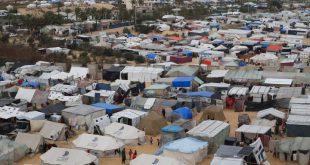Elections brought significant changes in 2021: E.U. stalwart Angela Merkel ended her 16-year leadership of Germany, and Hondurans chose their first female president. But in 2022 leadership of major states on every inhabited continent will be contested in the thick of two global crises: the COVID-19 pandemic and a climate catastrophe that grows more evident each week.
Here’s a roundup of the key elections in the year ahead, listed in their likely running order:
India
Although India’s general election is not until 2024, upcoming state assembly votes could define the future of the ruling Hindu nationalist Bharatiya Janata Party (BJP). With over 200 million inhabitants, India’s most populous state Uttar Pradesh will head to the polls in early 2022. Home to the constituency of the right-wing populist Prime Minister Narenda Modi, the state is part of the Hindi Belt of northern India, and a key indicator of the BJP’s popularity.
Under Modi’s leadership, the BJP has engineered the othering of Muslims in the country, reopened religious wounds, and empowered Hindu supremacist groups,Time reported.
South Korea
South Korea’s election on March 9 will likely come down to whether voters still trust the Democratic Party after five years in power—despite corruption allegations and little in the way of progress on reconciling with North Korea.
South Korean president Moon Jae-in must step down after a single term in office, and Lee Jae-myung, the Democratic former governor of the province around Seoul, is vying to take his place. However, Lee trailed Yoon Seok-youl of the traditionally conservative People Power Party in a recent poll, 31% to 42%.
France
History has not been kind to sitting French presidents–only one since 1988 has survived a re-election campaign. Yet incumbent leader Emmanuel Macron so far tops the polls for the 2022 presidential election.
When he first stood for national election in 2017, the centrist saw off opponents from parties that had dominated French politics for decades. But so did the other run-off candidate, Marine Le Pen, who strived to make the far-right National Rally party more palatable to conservative voters.
Macron won in a landslide, and when France goes to the polls in April, two candidates will compete for the anti-EU, anti-immigrant vote: Le Pen, and former TV commentator Eric Zemmour. Nicknamed the “French Trump,” Zemmour said he’s running “so that our daughters don’t have to wear headscarves and our sons don’t have to be submissive”.Whoever the opponent, Macron faces a tough fight.
Philippines
Rodrigo Duterte may be barred from another term as president, but the current frontrunners in the May 9 election indicate that his brand of authoritarian populism is far from over in the Southeast Asian nation.
Australia
It’s been a turbulent period in Australian politics since the last election in 2019: an initially sluggish vaccine rollout, contentious climate policies, and diplomatic embarrassments have undermined the prospects of the center-right Liberal/National Coalition.
According to polling by The Guardian, Prime Minister Scott Morrison’s approval rating is at its lowest since he vacationed in Hawaii in December 2019 while the country was ravaged by devastating bushfires. The “Black Summer” of 2019-20 claimed 33 lives, over 3,000 homes and more than 20 million hectares (49 million acres) of land.
Colombia
Colombia’s 2018 presidential election saw the far-right candidate Ivan Duque defeat his far-left rival, former guerrilla member and Senator Gustavo Petro, to become president. Next year, the scales could tip the other way, as the country goes to the polls for congressional elections in March and to choose a president in June. Duque is now the country’s least popular president since polling began in 1994, at over 70% disapproval, while Petro looks stronger than ever.
Kenya
Since the 1992 introduction of multiparty politics in Kenya, the country’s politics have been split along tribal divisions rather than political ideologies, and frequently tarnished by ethnic violence. That was the case in the 2017 ballot, which had to be rerun because of irregularities.
Afterward, president Uhuru Kenyatta, son of the country’s founding president, made peace with rival Raila Odinga. Kenyatta also proposed changes to Kenya’s constitution to promote power sharing among ethnic groups. But nothing is clear.
The general election is in August. At this point, Ruto is leading Odinga in the polls by 15 percentage points. But between the high cost of living, unemployment, hunger, the COVID-19 pandemic, and corruption, only 19% of Kenyans believe their country is headed in the right direction.
Brazil
Since being elected president in 2018, Jair Bolsonaro has built a reputation for denialism, first of the climate crisis, and then the pandemic. While dismissing COVID-19 as a “little flu,” the populist presided over the second highest official death toll in the world. In October 2021, Brazilian senators voted to recommend charging the president with crimes against humanity, citing pursuit of herd immunity policy and spreading COVID-19 disinformation.
Bolsanaro, a supporter of the military dictatorship that ruled Brazil from 1964 to 1985, has also undermined judicial independence, encroached on Indigenous land rights to clear the Amazon, and persecuted critics. Amid soaring inflation and a record drought, his approval ratings fell to a record low of 19% in late November,
“Only God” can remove him from power, Bolsanaro told tens of thousands of supporters in September. Nonetheless, the election is set for October 2022. Bolsonaro will likely face former leftist president Luis Inácio Lula da Silva whose 2017 corruption conviction was overturned in April.
US
On Nov. 8 2022, two years after Joe Biden beat Donald Trump, U.S. voters return to the polls to elect members of the House of Representatives and a third of the Senate. Midterm elections are traditionally bad news for the President whose term they bisect: in the past seven decades the president’s party has lost on average twenty-five House seats in them.
Biden’s 42% approval rating, according to Gallup, is lower than that of any other recent president at this point in office except Donald Trump. The Democrat is burdened by the world’s highest number of recorded COVID-19 deaths, rising inflation, a tarnished diplomatic reputation, and a Build Back Better bill that has not passed despite his party controlling—for now—both the House and the Senate.
Democrats can point to a massive pandemic relief bill, and a bi-partisan infrastructure package that Trump only promised. But candidates planning to run on the expansion of benefits and climate investments in Build Back Better instead are pursuing a goal of damage limitation and bracing for midterm results that could put wind in the sails of Biden’s arch rival for 2024.
 صراط عشق صراط عشق
صراط عشق صراط عشق




